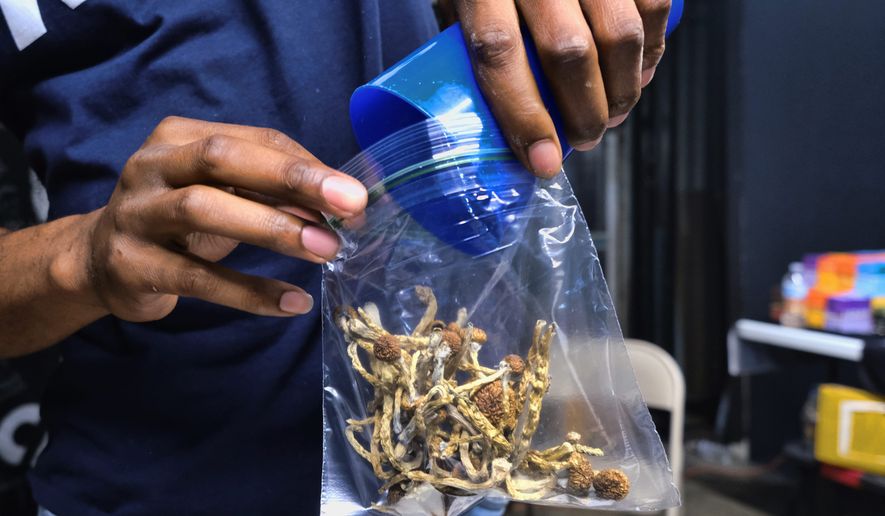D.C. voters would have the opportunity in November to make the District the fourth U.S. city to decriminalize psychedelic, or “magic,” mushrooms if activists collect enough signatures for a ballot initiative.
The D.C. Board of Elections on Wednesday approved the initiative proposal, which would make the non-commercial growth, purchase, possession and distribution of psychedelic mushrooms a low priority for police. City residents now have 10 days to challenge proposal. If the proposal survives the challenge period, activists will have 180 days to collect 25,000 signatures from D.C. voters to get it on the general election ballot.
Supporters of the initiative tout the medicinal benefits of psychoactive natural substances such as psilocybin mushrooms, mescaline and peyote in treating ailments such as depression, anxiety and post-traumatic stress disorder.
“We aren’t arguing for people to be partying and using drugs, what we really want is access to medicine,” said Seth Rosenberg, a spokesman for the nonprofit Campaign to Decriminalize Nature DC.
The initiative would apply to psychoactive drugs like ibogaine, which has been heralded in treating opioid addiction; mescaline; dimethyltryptamine or DMT; psilocybin or psilocin, which can be found in peyote, ayahuasca, mushrooms and in three plants indigenous to the District, said Mr. Rosenberg, who studies fungi as an amateur mycologist.
“I have seen the plants growing outside of police stations and on school properties, but nobody knows that they are there,” he said.
“The idea that somehow we need to go through a doctor to take these incredibly safe substances we can find on the ground for free, it seems counterproductive,” Mr. Rosenberg added.
He noted that no deaths have been attributed solely to natural psychedelics and that it can cost as much $1,000 to get a gram of the medical-grade psilocybin.
The Office of the U.S. Attorney for the District of Columbia declined to comment Thursday. The Metropolitan Police Department suggested filing a Freedom of Information Act request for arrest data related to the drug.
On Tuesday, the Southern California city of Santa Cruz decriminalized psychedelic mushrooms, joining Denver and Oakland, which both decriminalized the substance last spring.
In 2000, Johns Hopkins University was the first research facility in the country to win approval for restarting examinations of the medicinal benefits of psychedelics.
Mr. Rosenberg said he was able to keep his promise to his daughter to quit smoking cigarettes with the help of mushrooms.
Wyly Gray, a Marine Corps veteran, however, said he used ayahuasca to overcome suicidal thoughts, anxiety, PTSD and depression.
Shortly after Mr. Gray returned from Afghanistan in 2008, his support system to help with his transition to civilian life deteriorated. His then-wife’s father died in a car crash and her mother was murdered in a span of three weeks.
In 2012, Mr. Gray was accepted to Georgetown University, where he is a full-time student and has made the dean’s list.
Mr. Gray says he looked successful on the outside but inside “I didn’t feel like I had any reason to stay.”
He exhausted all treatment options from individual and group therapy, to eye movement desensitization and reprocessing therapy, to adventure therapy and medication. None of it worked for him.
After researching ayahuasca and “with a lot of fear in [his] heart,” Mr. Gray traveled in 2017 to Iquitos, Peru, where he participated in three sessions that changed his life. He is no longer has suicidal ideas, doesn’t drink or smoke, and is able to sleep.
He even changed the mission of his nonprofit, Veterans of War, from focusing on preserving veterans stories as a means for healing to taking groups to Peru to undergo ayahuasca sessions. The first group of four veterans will travel there in April.
“We are fighting against a clock that’s ticking every day to the tune of 20 veterans committing suicide, and it’s a preventable,” Mr. Gray said.
• Sophie Kaplan can be reached at skaplan@washingtontimes.com.




Please read our comment policy before commenting.